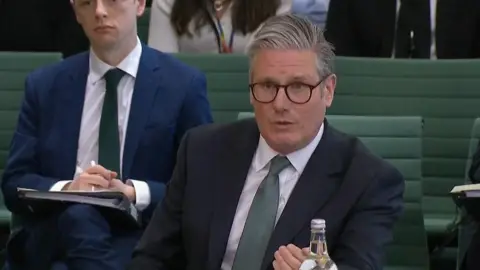Starmer criticises watchdog's benefits forecasts
 PA Media
PA MediaPrime Minister Sir Keir Starmer has criticised how the Office for Budget Responsibility watchdog has analysed the impact of his benefit changes.
Appearing at a parliamentary committee, he said the OBR, which monitors public spending plans, had assumed that "not a single person" would change their behaviour as a result of the government's proposals.
"I personally struggle with that way of looking at it, because I do think these measures will make a material difference," Sir Keir said.
The prime minister hopes his plans, which include making it harder to claim disability payments, will save money and help get more people into work, however there is uneasiness among his own MPs over the cuts.
Sir Keir was challenged over the plans during an appearance in front of Parliament's Liaison Committee, made up of senior MPs.
Debbie Abrahams, chairwoman of the work and pensions committee, noted that an impact assessment produced by the government said the changes could push 250,000 people into poverty, while the Joseph Rowntree Foundation charity put the figure at 400,000.
The Labour MP said children who grow up in poverty are more likely to struggle to find work or employment later in life and asked the prime minister how he would ensure his approach addressed the root causes of poverty "rather than add to them".
In response, Sir Keir said: "On the impact assessments it is significant to my mind that the ability of any policy or legislation to change any behaviour at all is not priced in.
"The OBR has scored nothing against any change here - the assumption is that not a single person changes their behaviour."
Last month, the OBR published its assessment of the government's spending plans and performance.
On the government's plans to provide additional support for people with health problems to get into work, the OBR said it might increase employment, but the government had not yet provided enough details of the policy for its effectiveness to be judged.
On other parts of the policy, such as reducing the eligibility for health and disability benefits, the OBR said it had not been given enough time to develop an analysis of the impact on the labour market and that it would make a full assessment before its next forecast.
The government's changes include stricter eligibility tests for those claiming personal independence payments and a freezing of incapacity benefits under universal credit.
At the committee hearing, the prime minister also said:
- He was disappointed about US tariffs but said the UK should not "jump in with both feet" into retaliation
- "All options remain on the table" when it comes to the future of the Scunthorpe steel plant
- A review into social care would produce an interim report by 2026
Following the committee, Conservative leader Kemi Badenoch said: "Labour literally passed a law in October requiring the government to listen to the OBR... now they're criticising it.
"Another [Rachel] Reeves gimmick that shows they don't know what they are doing."
The government's law announced in July prevents future governments from side-lining the OBR.
It means the independent forecaster can make assessment of announcements which make permanent tax or spending commitments worth more than 1% of the size of the UK's economy.
